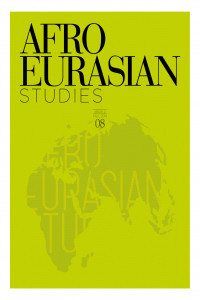Afrika'da Küreselleşme ve Kalkınma
Bu makale, Afrika kıtası için küreselleşme kavramını, tarihini, araçlarını ve sorunlarını incelemektedir. Şu anda küresel siyasetin fizyonomisini değiştiren son gelişmelerden biri olarak tanımlarken, özellikle oyuncuların eşitliği, politika sürecine gerekli girdiler ve kapsayıcı atılganlık alanında özellikle Afrika için zorluklarına, sonuçlarına ve etkilerine odaklanıyor. Bu süreçte, küreselleşmenin sermayenin dünyanın geri kalanı üzerindeki nihai fethi olduğu ve onun “öncülleri” ve “eşitsiz kalkınma tezi”nin tek kollu eşkıyalık ve ahlak anlayışı bağlamında açıklanabilir olduğu tartışılmış ve ortaya konmuştur. Ayrıca, dünyanın siyasi ve sosyo-ekonomik yapısının aşkın homojenleştirilmesi amacına ve insanlığa sağladığı iddia edilen faydalara bakılmaksızın, bunun böyle olmaya devam edeceği iddia edildi. Çalışmamızın temel tezi, küresel köye üye devletlerin güç ve çıkar asimetrisinin yanı sıra oradaki oyunun kurallarındaki orantısızlığın Afrika'ya ve halkına fayda sağlayamayacağıdır. Bu böyledir ve böyle olmaya da devam edecektir çünkü küreselleşme, Afrika kıtasının “neo-neo-sömürge tarzında” yeni bir marjinalleşme ve yeniden sömürgeleştirme düzenidir. Aynı şekilde, herhangi bir inandırıcı alternatif olmaksızın bir 'Mutlak Gerçek' konumuna yükseltilmesinin olduğunu savunduk. Afrika, yirmi birinci yüzyılın zorluklarından kurtulmayı umuyorsa, doğası gereği gerçekten gerçek ve kararlı bir siyasi, kültürel, sosyolojik ve ekonomik yeniden düzenleme yapmalıdır.
Anahtar Kelimeler:
Küreselleşme, Kapitalizm, Marjinalleşme, Afrika, Kalkınma.
Globalization and Development in Africa
This paper examines the concept of globalization, its history, instruments and problems for the African continent. While identifying it as one of the recent developments currently changing the physiognomy of global politics, it specifically focuses on its challenges, consequences and implications for Africa particularly, in the realm of equality of players, requisite input into the policy process and, the encapsulating assertiveness of the global village. In the process, it was argued and revealed that, globalization is the final conquest of capital, over the rest of the world and that its “antecedents” and “uneven development thesis” are explainable within the context the one-arm banditry and ethos of capitalism. Furthermore, it was argued that this will continue to be so, irrespective of its aim at the transcendental homogenization of political and socio-economic structure of the globe and its purported benefits to mankind. The central thesis of our study is that the asymmetry of power and interests of the member states of the global village, as well as the lopsidedness in the rules of the game therein cannot benefit Africa and her people. This is so and would continue to be so because globalization is a new order of marginalization and recolonisation in a “neo-neo-colonial fashion”, of the African continent. We equally argued that its elevation into a position of ‘Absolute Truth” without any credible alternative is a. disastrous entrapment for Africa from which the latter must free itself through a genuine and committed political, cultural, sociological and economic realignment and restructuring that is truly African in nature, if it hopes to survive the challenges of the twenty-first century.
Keywords:
globalization, capitalism, marginalization, Africa, development,
___
- Martin, K. (2001) Globalization and the Youth, Ibadan Spectrum Books Publishing, LTD
- Nwala, T.U (1985) Globalization and Development, Port Harcourt Spectrum Books LTD
- Nwosu, S. (2005) Globalization, inequality and Human condition: An Assessment of Capitalism And Imperialism, Social Science Studies, Monograph.
- Ake, C. (1996)” Is Africa Democratizing? Port Harcourt” Centre for Advanced Social Science.
- Eehezona, N. (1998). International politics in the post Cold war Era, Awka, Nigeria, Meks Publishers, Ltd.
- Ama, T. (1997). Globalization and Changing Role of University in Nigeria, Newsletter of the Social Science Council of Nigeria, Vol.2. No I.
- Alubo, O. (1999). Globalization and Changing Role of University in Nigeria, Newsletter of the Social Science Council of Nigeria, Vol.2. No.1
- Amin, S. (1996). The Future of the Global polarization Social Justice, Vol.23 Nos. 1&2.
- Tomblinson, J. (1996). Cultural Globalization Placing and is placing.
- Tomblinson, J. (1995). Homogenization and Globalization”, the European Journal of Development Research, Vol. 2, No, 1.
- Ogbonna, M. (1998). The Concept and Process of Nigeria’s Seminar on:
- Trends in Globalization of the World affairs.
- Olisa, M.S.O (1998): Nigeria and Globalization; Lessons from United State; Paper presented at seminar organized by the Centre for American Studies, Nsukka, Nigeria.
- ISSN: 2147-110X
- Yayın Aralığı: Yıllık
- Başlangıç: 2012
- Yayıncı: Musiad (Independent Industrialists and Businessmen's Association)
